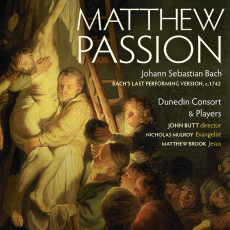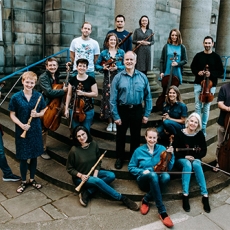JS Bach Matthew Passion - Dunedin Consort - McAlister Matheson Music Newsletter
Following their success in exploring Handel's Dublin version of Messiah, John Butt and the Dunedin Consort have turned their attention to the Matthew Passion. Butt has opted for the one-voice-to-each-part approach (as first proposed by Joshua Rifkin, on the basis of surviving sets of performance parts). There are therefore eight principal singers, i.e. four in each of the two choirs, who also sing the solos. He has also recreated the instrumentation known to have been employed by Bach in his last performance of this work, the main change being the substitution of a harpsichord for the organ in orchestra two, allowing for greater contrasts of texture. (Orchestra one retains its organ.) One might expect this vocally pared-down approach to result in a dramatically less effective experience; paradoxically, the opposite is true. This is one of the most dramatically involving and emotionally searing performances of this work to have appeared on disc. Partly it's due to the choruses being delivered in what can only be described as a more soloistic fashion - rather than a blend of massed voices, you hear clearly the contribution of each individual voice, allowing for more direct emotional communication. The first chorus demands us to "Come and help me lament"; on track 14 (Wo willst du) the effect is of gentle chatter amongst the disciples; while track 36 on CD1 has the fieriest Sind Blitze, sind Donner you're likely to experience. Hearing these same voices in the solos draws the listener further into the story - and there is some exceptional singing in the arias, as well as marvellous playing from the two orchestras. Susan Hamilton is on top form in an artless Aus liebe, but her counterpart in choir two, Cecilia Osmond, delivers an equally fine Blute nur, and alto Clare Wilkinson's arias are ravishingly beautiful. Passion performances often dwell on the arias and let the Evangelist move the action on swiftly, but here it's more the other way round. Butt keeps the arias moving, and allows Nicholas Mulroy as the Evangelist time to tell his story without being rushed. Matthew Brook portrays Jesus as very much a human figure, subject to normal human feelings, rather than a remote, ethereal being. John Butt's excellent booklet essay makes it clear that the particular set of historical parameters used for this performance is not the only approach possible, but rather one of many which can be used as a jumping-off point to explore the possibilities for creative expression. The result on this occasion is a musical experience that is, as he hoped, almost on the threshold of what is emotionally bearable.

